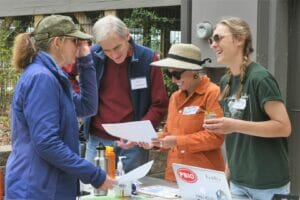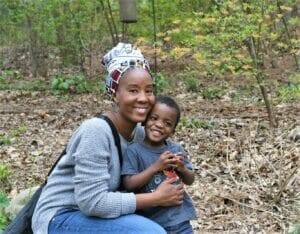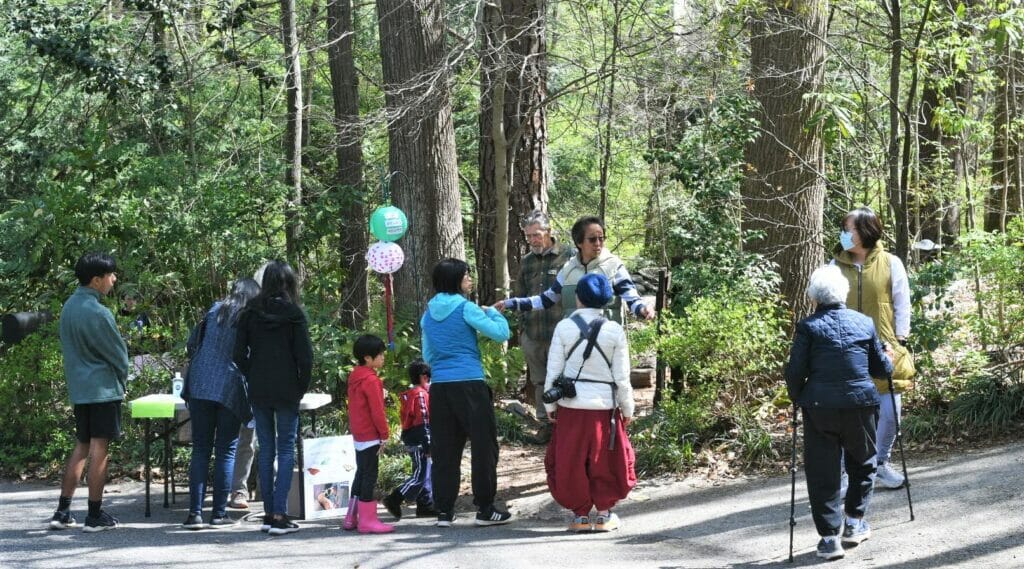Photo credit: Leslie Inman
Article by Amelia Aidman
Something beautiful is happening in Atlanta. More and more Atlantans are embracing a new vision of gardening that encourages nurturing plants native to the local environment. Ideas are spreading like wildflowers and, among other groups and initiatives, the newly formed Intown Atlanta chapter of the Georgia Native Plant Society (GNPS) is helping this growing trend bloom.
On Saturday, April 2, the chapter held its first public event with an inaugural annual Native Plant Tour.
Native azaleas in blazing colors, a scarlet buckeye in full flower, blueberry bushes with still tiny berries, enormous trillium, an old growth forest with some of the tallest trees in the area and a natural waterfall, innovative hardscaping created by a can-do attitude with resources that might otherwise be seen as yard waste–these were all among the delights taken in on the tour. Six sites in the Druid Hills and Decatur areas were included in the tour—2 nature centers and 4 homes on private land. More than 300 people participated.
Animated conversations among the visitors and native habitat gardeners made for an excited buzz. The atmosphere was one of friendly feelings and an air of community with visitors running into friends and acquaintances. People shared information and new acquaintances were formed.

Photo credit: Laura Markson

Photo credit: Laura Markson
Barefoot in her garden, as she often is, Virginia Dupre, one of the homeowners and an accomplished gardener, called the mood one of “curiosity, appreciation, awe and wonder.” Visitors expressed gratefulness for her garden’s beauty, her knowledge and her work over decades to create her garden. Fallen leaves on her property are used in her yard–gently raked into the plant beds. Since beneficial pollinator insects overwinter in the leaves, she is careful not to chop them up or otherwise disturb what is living and reproducing in them. If she doesn’t have enough of her own leaves, she will use the leaves of neighbors who otherwise leave them out for county curbside pickup.
Leaving the leaves is a common practice among those who are gardening with natives. In lieu of a yard of manicured lawn they create native habitats featuring mostly, or all, indigenous plants. Those going in that direction find little need for the noisy and toxic landscaping practices in use by much of the lawn care industry. Aside from the benefit to the urban environment by not polluting with heavy machinery and not adding to peace-destroying noise, native habitat gardening feeds pollinating insects, including butterflies, as well as birds.

Photo credit: Laura Markson
Walking through the Decatur neighborhood from the Wylde Woods at Oakhurst Garden to the nearby Pardue residence, looking at the yards along the way, there was a sense that many in the neighborhood have been influenced by the presence of that center, which educates about plants and environmental issues. Many of the houses had kept fallen leaves, using them instead of commercial mulch, and had plants that are indigenous to the region growing in their yards. They were not lawn-centric. It is as though the ethos of Wylde Woods at Oakhurst Garden radiates out into the neighborhood raising awareness of these issues.
Alex Dileo, the 28-year-old Board Chair of the new Intown chapter of the Georgia Native Plant Society (GNPS), said that the event’s organizers are motivated by a shifting paradigm that resists and eschews the hegemony of the green grass lawn in favor of a model of planting that feeds pollinators, soil, and people. She was spurred to switch from a grass lawn to plant natives after participating in GNPS native plant rescue events, and says that after just two years “I see bees buzzing, fireflies, and birds nesting in my trees”. She lives in the southwest Atlanta Oakland City neighborhood and her home’s lot is small, but she encourages even those who have access to more limited spaces such as a balcony or window boxes to grow native plants, saying that they will notice changes.
For those of us trying to support a cleaner, healthier local environment, the tour was exciting, affirming and imbued us with hope. We know that the stakes are high if the current ways of tending lawns remain dominant. We also recognize that we can’t assume that government entities and related corporations will enact the needed changes without a groundswell movement created by people who care deeply about these issues.
The native plant habitat tour gave us a day of “positivity” according to organizing committee member, Leslie Inman. It was a day to learn, a day to teach, a day to be inspired and to feel that we are a part of something bigger; to know that we are adding a piece to the puzzle in how to evolve from non-sustainable practices to those that nurture the earth and ourselves. The nature centers and homegrown yards in this first annual native garden habitat tour are the evolving result of years of loving care that is bearing fruit.
Future native garden habitat tours across the Atlanta area are on the group’s agenda. The plan is to highlight gardens in different seasons, as well as varied eco-systems and habitats. Atlanta’s new GNPS chapter aims to involve and connect with both seasoned native plant gardeners, those who are newly interested and just getting started in their rewilding quests, as well as those anywhere else along the path. Kudos to the energetic organizing committee that did such a wonderful job of spearheading this inaugural event!
To inquire about joining the Georgia Native Plant Society, send an email message to intown@gnps.org or link to the “Become a Member” page on the GNPS website: https://gnps.org/get-involved/become-member/.
Amy Aidman, Ph.D., is an expert in the area of children and media research. She is Emeritus faculty of Emory University’s Department of Film and Media where she developed and taught classes on children and media and other media-related topics and was the Director of the Media Studies degree programs. She currently serves as Board of Directors Chair for Kids Video Connection. Amy is also an Intown Atlanta chapter GNPS member and is avidly learning about environmentally friendly gardening practices, she is reshaping her own garden to encourage pollinators.

